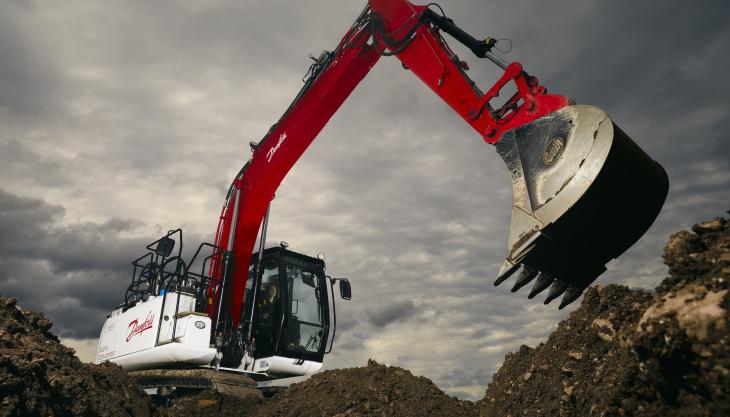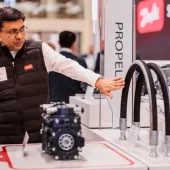UK Government grant for Danfoss Power Solutions

Danfoss plan to make electric off-road vehicles cheaper to own and run than diesel equivalents
GLOBAL hydraulics and electric powertrain systems supplier Danfoss Power Solutions have secured a grant worth £407,112 from the UK Government to accelerate the electrification of construction machinery. The UK Department for Business Energy and Skills awarded the grant through its Red Diesel Replacement competition, which seeks to accelerate the transition to electric off-road vehicles such as excavators and wheel loaders.
Danfoss plan to combine electrification with their Digital Displacement technology to significantly improve machine efficiency. Reducing energy consumption by as much as 50%, the technology can dramatically decrease the size of batteries needed to power the machines and the amount of energy needed to charge them.
Danfoss are already constructing a £25 million state-of-the-art manufacturing, research, and development facility in Edinburgh, Scotland, to commercialize their Digital Displacement technology and Editron electric drivetrains, which they believe will transform the construction machinery sector. Dubbed the Decarbonization Hub, the facility will become operational next year.
‘Our new UK facility will be an important hub for Danfoss decarbonization programmes. This grant from the UK Government recognizes the potential of our efforts and will help us realize our plans,’ said Leif Bruhn, head of Digital Displacement at Danfoss Power Solutions. ‘These funds will be used to accelerate the work we’re doing to develop next-generation, climate-friendly technologies in hydraulics, digitalization, and electrification.’
‘The International Energy Agency says that 44% of the Paris climate commitments can come from energy-efficiency improvements, and Danfoss are taking on this challenge in the area of construction machinery,’ explained Niall Caldwell, senior director of R&D for Digital Displacement at Danfoss Power Solutions. ‘The majority of large machines still use diesel engines, and we calculate that, worldwide, construction machinery emits around 400 megatons of carbon dioxide annually.
‘Electrifying construction equipment is not straightforward,’ Mr Caldwell continued. ‘For a large excavator, the daily power consumption is so high, the batteries required are the equivalent to as many as 10 typical electric car batteries, which could cost as much as the machine itself. The key, we believe, is efficiency.’
Danfoss research has shown that as much as 70% of an excavator’s energy is wasted in the hydraulic system between the engine and the working functions. Significantly reducing this energy loss will enable future machines to use much smaller, and therefore cheaper, batteries.
Danfoss’ computer-controlled Digital Displacement technology can significantly improve system efficiency and reduce energy use. A paper Danfoss submitted to the International Fluid Power Conference (IFK), one of the world’s largest scientific conferences on fluid power, shows that Digital Displacement technology can already deliver a 24.8% lower capacity battery to complete eight hours of typical operation.
‘This new grant will accelerate technological developments to reach 50% improvement,’ said Leif Bruhn. ‘Our goal is to make electric off-highway machines cheaper to own and run than diesel equivalents. This programme will allow us to prove that combining better efficiency alongside electrification is the most effective way to bring down cost, improve performance, and hasten the adoption of electric off-highway machines worldwide, which is what we all want to achieve.’









